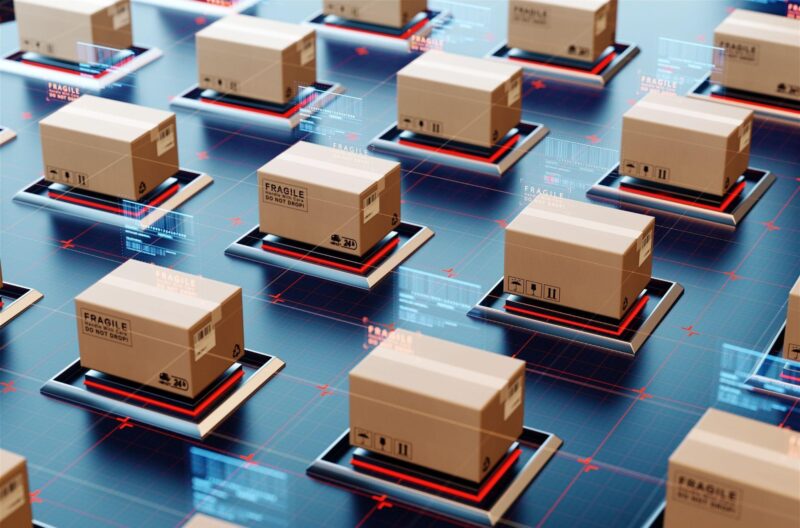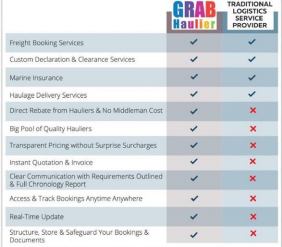
This site
is mobile
responsive

The rise in e-commerce and the digital economy due to the increase of digital users during the pandemic has accelerated the pressures on an already busy logistics sector to support both foreign and domestic demand for transport/ import-export purposes.
Google’s e-Conomy SEA 2021 report found that the pandemic’s effect has led to 81 per cent of Malaysian internet users consuming digital services today, while 43 per cent of Malaysian merchants would not have survived strict lockdowns if not for e-commerce marketplaces. Even though production and social capacities have returned mainly to 100 per cent as Malaysia enters the endemic phase, both digital merchants and users are likely to keep buying and selling online.
As a result of the increased digital service use, Malaysia’s internet economy was valued at US$21 billion (RM88.8 billion) in 2021, and is projected to reach US$35 billion by 2025.
The logistics industry, which has long served as a backbone for the growth of Malaysia’s industrial landscape is seeing a large influx of orders for both domestic and foreign demand, leveraging Malaysia as a key transhipment hub for large marketplaces such as Alibaba through the Digital Free Trade Zone.
Businesses depend immensely on the logistics infrastructure to be efficient and uninterrupted in reaching their consumers, thus raising the expectations of the logistics industry to keep expanding and evolving to stay ahead of the competition.
On the policy side, the Government of Malaysia views logistics as a priority industry with several initiatives introduced such as the Third Industrial Master Plan 2006-2020, the Logistics and Trade Facilitation Masterplan 2015-2020, and the National Transport Policy 2019-2030.
However, in the Logistics Performance Index 2018 released by the World Bank, Malaysia ranked 41st out of 160 countries, behind ASEAN peers such as Singapore, Thailand and Vietnam. The Organisation for Economic Co-operation and Development (OECD) noted that timeliness is the most challenging issue for Malaysia, as consumers are willing to pay premium prices for faster deliveries.
The growth of the logistics ecosystem in Malaysia has traditionally been hindered by the lack of transparency, slow communication, and manual processes. With the dawn of Industry 4.0 and increased trust in digital services such as analytics, cloud and marketing, merchants, transshipers, warehouses, and ports authorities are increasingly exploring digital transformation to stay ahead of the regional and global logistics competition while keeping costs low.
The explosive growth of e-commerce encourages logistic companies in Malaysia to go through a series of digital evolution in their operations to form seamless e-fulfilment hubs in the country to efficiently serve global supply chain activities. Since establishing the National E-Commerce Strategic Roadmap, a total of 11 e-fulfilment projects were approved until 2020.
Total Logistics Solution Provider
Established in 2017, Grab Haulier Sdn Bhd is a new entrant to the local logistics space, inspired by the sharing economy to connect customers with the right logistics services by digitising the logistics supply chain. With an in-house team of researchers and developers, the Grab Haulier digital freight matching platform was finally launched in December 2019, the first of its kind in Malaysia.
Grab Haulier is a one-stop cloud-based platform that seamlessly connects key components of the logistics supply chain such as freight forwarders, hauliers, shippers and consignees. It optimises transportation operations, and streamlines the entire process by standardising and digitalising the workflow.
This essentially puts an end to time-consuming back-and-forth enquiries and negotiations through instant communication and information, live updates and transparent listing of prices and business ethics. The digital platform also enables real-time quotations and consignment tracking, and flexible execution of broker deals, allowing the tasks to be done anytime and anywhere.

The company leverages the latest technology to match customers with the right service provider, similar to e-hailing services
Customers can post their upcoming cargo transportation requests, then access a pool of hauliers that meet their requirements and get instant quotations via the platform.
This service extends to shippers as well, as Grab Haulier provides customs clearance, marine insurance and freight services, in addition to the usual haulage and trucking services.
Big transporters such as DHL are leveraging the Internet of Things to offer smart shipment services. Meanwhile, well funded unicorns such as Flash Express, Ninjavan, LELExpress, and Lalamove are cornering the quick delivery space. Hence, SME transporters must evolve digitally or risk extinction in the race to adapt to Industry 4.0.
Customer expectations on service levels, timeliness and pricing have risen accordingly, making it even harder for independent hauliers to compete with the big brands.
Hauliers also often work with skeleton crews and thus may not be able to spare additional staff to supervise digital platforms. The Grab Haulier platform makes this easy for both customers and hauliers, giving them a birds’ eyes view of all jobs on its user-friendly web portal.
The web portal serves as a one-stop portal for customers to post their jobs for freight forwarding and haulage services, monitor and track job progress, and improve overall operational efficiency through the data filtered and extracted from the platform.


End-to-End Integration Across the Logistics Supply Chain
The Grab Haulier platform is offered to the market as free-to-use with zero subscription fees and has so far recruited more than 50 hauliers. To build on the smart logistics suite of services, Grab Haulier plans to invest in expanding the logistic supply chains in Penang and Johor. Pipeline plans include integrating other related ecosystems such as ports, depots, warehouses, and other associated areas into one system.
Ultimately, the goal is to lead the digital transformation of the logistics industry by providing end-to-end solutions that can improve the productivity and efficiency of the entire supply chain infrastructure and help industry players gain better access to global markets. MIDA welcomes this increasing trend of companies adopting digital solutions to make businesses more efficient and increase the country’s competitiveness.
MIDA supports the growth of companies undertaking integrated logistics services (ILS) by offering the ILS incentive and International ILS (IILS) status. As of 2021, MIDA had approved over 100 ILS projects, of which the majority of the applicants were Malaysian-based companies.
ILS incentives include the Pioneer Status incentive on statutory income of five (5) years and 60 per cent investment tax allowance on qualifying capital expenditure incurred within five years, which can be offset against 70 per cent of the investor’s statutory income for each assessment year.
To learn more about smart logistics, e-fulfillment hubs, and other logistics 4.0 efforts, contact the Oil and Gas, Maritime and Logistics Services Division of MIDA.
Newsletter March 2022